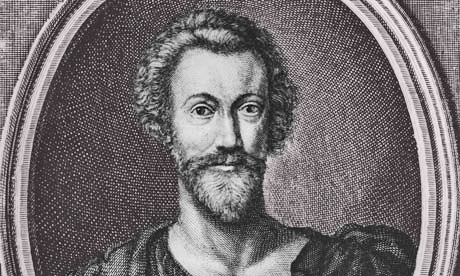
While working as a secretary to Sir Thomas Egerton, the Lord Keeper of England, John Donne met Ann More, daughter of a parliamentary representative. They were secretly married in 1601. When word got out, a faction of upper level officials reacted violently. Donne lost his job before being imprisoned, and was thereafter estranged from much of the British nobility. “Friendship on earth we may as easily find / As he the northwest passage that is blind,” Donne wrote in one of his metaphysical sonnets, perhaps alluding to the difficult social terms in which he found himself. In the letter below he reaches out to Sir Henry Goodyer, a recent acquaintance, and manages to find such a “passage”; during the following years Goodyer became his closest friend.
To Sir Henry Goodyer
March 1607
Sir,
Though my friendship be good for nothing else, it may give you the profit of a temptation or of an affliction. It may exercise your patience, and though it cannot allure, it shall importune you. Though I knew you have many worthy friends of all ranks, yet I add something, since I, which am of none, would fain to be your friend too. There is some of the honor and some of the degrees of a creation to make a friendship of nothing.
Yet, not to annihilate myself utterly (for though it seem humbleness, yet it is a work of as much almightiness to bring a thing to nothing as from nothing), though I be not of the best stuff for friendship, which men of warm and durable fortunes only are, I cannot say that I am not of the best fashion, if truth and honesty be that which I must ever exercise towards you, because I learned it of you. For the conversation with worthy men and of good example, though it sow not virtue in us, yet produceth and ripeneth it.
Your man’s haste and mine to Mitcham cuts off this letter here, yet as in little patterns torn from a whole piece, this may tell you what all I am. Though by taking me before my day, which I accounted Tuesday, I make short payment of this duty of letters, yet I have a little comfort in this, that you see me hereby willing to pay those debts which I can before my time.
Your affectionate friend,
John Donne
You forget to send me the Apology, and many times I think it an injury to remember one of a promise lest it confess a distrust, but of the book, by occasion of reading the dean’s answer to it, I have sometimes some want.
Note: The Apology was an anti-Protestant tract circulated by the Vatican. Donne would later refute the treatise in his Pseudo-Martyr (1610) and Ignatius His Concave (1611).
From John Donne: Selected Letters. London: United Kingdom (2002), p. 20.
FURTHER READING
Getting friendly with the gods: Robert Pinksy on Donne.
The book of his lifetime.
The seven part series at The Guardian on Donne as both priest and poet.


